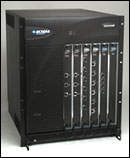Acopia ARX1000
Unstructured data, or data outside of a database, comprise about 80% of an enterprise’s data, says Brendon Howe, Acopia’s VP for marketing and business development. Acopia’s Adaptive Resource switches offer a global view to each application without the need to reconfigure or add additional mount points, Howe says. The technology pools and virtualizes heterogeneous storage to offer a consolidated view of files and storage resources, eliminating “islands of storage,” he adds.
“As unstructured data balloons to such a large proportion of all data stored in enterprises today, CIOs are being forced to manage it as part of the data center infrastructure, not just as content,” says Steve Duplessie, founder and senior analyst at Enterprise Storage Group. “Existing approaches aren’t well suited to handle the breadth and scale of files that exist within many enterprises today. Acopia’s ARX products are the most innovative technology we’ve seen that address the significant challenges of unstructured data on a global scale.”

Acopia ARX6000
Howe says Acopia’s new products, the ARX6000 and ARX1000, are network devices that provide real-time access to data usage patterns. The devices sit on top of SAN, NAS or DAS, saving on capacity and operational expenses.
“No one else offers this kind of functionality,” Howe boasts.
Merrill Lynch and Warner Music are two early customers. Merrill is using the technology to consolidate more than 100 data sites down to three, and Warner Music is using it to manage 20TB of rapidly growing capacity and millions of files like .WAVs and .MP3s. The two firms are using the technology for applications like server consolidation, global namespace for clients, data life cycle management, data migration to classes of storage, capacity balancing and enterprise-wide file services.
“Acopia’s switches create a virtualized storage infrastructure,” says Mike Karp, senior analyst at Enterprise Management Associates. “They will be particularly valuable for complex sites that need to simplify all their unstructured data within a single, simply-managed entity. By virtualizing all storage, whatever its class, Acopia provides the groundwork for an efficient, consolidated storage management environment.”
The ARX6000 lists for $150,000 and is designed for high-performance access to an infrastructure of more than 500 million files per switch. The ARX1000, which lists for $45,000, is designed for capacities of 100 million files per switch.
Acopia was founded in 2002 by company chairman Cheng Wu, who previously founded ArrowPoint (acquired by Cisco) and Arris (acquired by Cascade, which was acquired by Ascend, which was acquired by Lucent, for those of you keeping score at home). The company raised $30 million in venture funding a year ago.


